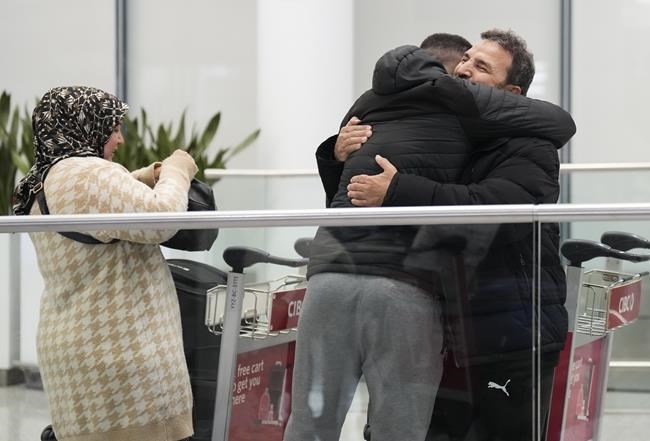OTTAWA — Evacuees who escape from the Gaza Strip will need help to access mental-health care and housing, as well as assistance to get other family members out of the embattled Palestinian territory, the Canadian Council for Refugees said Thursday.
The slow trickle of people allowed through the highly controlled Rafah border crossing out of Gaza has so far included107 peopleon Canada's list of anticipated evacuees, and they are only allowed to remain in Egypt for 72 hours.
The list includes Canadian citizens and permanent residents, as well as eligible family members who don't have immigration status in Canada.
Some of the first few Canadians to escape the constant bombardment in Gaza arrived at the TorontoPearson International Airport on Thursday.
"They're definitely going to need support and outreach, coming out of a very traumatic time," said Gauri Sreenivasan, the council's co-executive director.
For those who arrive without immigration status, it will be especially important to make sure they have access to settlement services that are tailored to the trauma they've endured for the last month, Sreenivasan said.
"This will include the need for supports, for identifying what they need in terms of housing and support for work permits," she said.
"Critically, they will need information and support in processing the paperwork that's required both for themselves here, but (also) for other family members."
Reuniting families outside of Gaza will be key in setting them up for success in Canada, she said.
Services and immigration status will have to be determined based on individual circumstances once people make their way to Canada, Immigration Minister Marc Miller said in an interview this week.
The federal government has been working to secure the safe passage of more than 500 people with connections to Canada as part of ongoing negotiations between Israel and Egypt that are being mediated by Qatar, the foreign affairs minister said Thursday.
Global Affairs Canada says it is also aware of reports that four Canadian citizens got out with the help of a third party.
Miller says family members without Canadian citizenship or permanent residency status will be offered temporary status so they can remain in Canada, and if they need work permits, his department will work on that as well.
"I think it's something we'll tackle as the case may be," he said in an interview on Monday.
People who come to Canada as family members should be able to apply for permanent residency under the family reunification immigration program, Sreenivasan said.
As for settlement services and income support, Miller said new arrivals from Gaza will be dependent on their Canadian families. The Immigration Department will assess their needs from there.
"We'll have to look at what that means, and look at the volume," he said.
"I don't know the financial situation of a lot of people leaving. I can't suspect that it's great, but I don't presume people don't have funds, either."
The Gaza Strip has been under almost constant bombardment since Israel launched a retaliatory attack on Hamas for the Oct. 7 incursion that killed 1,400 Israelis. About another 240 were taken from Israel into Gaza by the armed militant group.
The number of Palestinians killed in the war passed 10,800, including more than 4,400 children, the Hamas-run Health Ministry in Gaza said Thursday.
For now, while the border remains completely closed to most of the 2.3 million residents in the occupied territory, Canadian immigration officials have not yet turned their mind to the possibility of welcoming refugees from the region.
"There are a number of security considerations and policy considerations that are compelling us to focus on Canadians. We want to get Canadians out," Miller said.
But he added that Canada will be humane if people manage to escape the war and flee to its borders.
The Canadian Council for Refugees said the need to get Canadians out should be coupled with much stronger diplomatic action from Canada in calling for a ceasefire
"There is no safety for those trying to move within Gaza or out of Gaza, or for those who are staying," Sreenivasan said.
"The overwhelming urgency for Canada is to become much more formal at calling not just for a pause, but for a sustainable ceasefire to end the attack on civilians."
Prime Minister Justin Trudeau and other government officials have stopped short of calling for a ceasefire in Gaza, and have instead called for significant "humanitarian pauses" that are long enough to get aid into Gaza and evacuate people from the area.
Israel has agreed to put in place four-hour daily humanitarian pauses in its assault on Hamas in northern Gaza, the White House announced on Thursday.
Miller said that once Canadians are out of Gaza, the next consideration will be whether the government needs to find a way to get Canadians out of neighbouring Lebanon.
Israeli troops and Hezbollah militants and their allies have been clashing along the Israel-Lebanon border since the start of the war.
"That is the next set of considerations that I hope does not come to fruition, because that means that the conflict has escalated," Miller said.
In the meantime, refugee advocates have encouraged the Immigration Department to speed up the processing of refugee claims for Palestinians and others in the region that were already underway.
This report by The Canadian Press was first published Nov. 9, 2023.
— With files from The Associated Press.
Laura Osman, The Canadian Press



